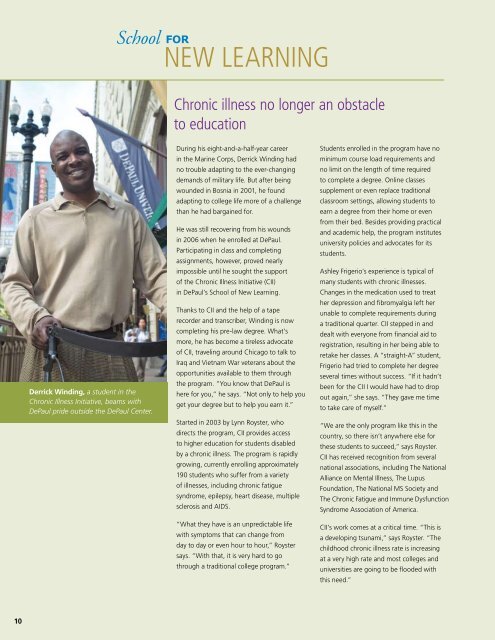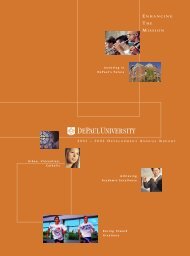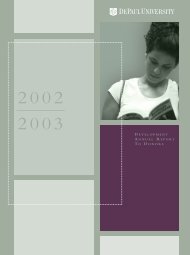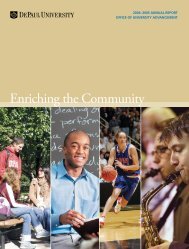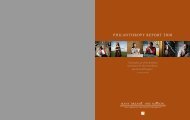fulfilling our - Alumni - DePaul University
fulfilling our - Alumni - DePaul University
fulfilling our - Alumni - DePaul University
Create successful ePaper yourself
Turn your PDF publications into a flip-book with our unique Google optimized e-Paper software.
10<br />
Derrick Winding, a student in the<br />
Chronic Illness Initiative, beams with<br />
<strong>DePaul</strong> pride outside the <strong>DePaul</strong> Center.<br />
School FOR<br />
NEW LEARNING<br />
Chronic illness no longer an obstacle<br />
to education<br />
During his eight-and-a-half-year career<br />
in the Marine Corps, Derrick Winding had<br />
no trouble adapting to the ever-changing<br />
demands of military life. But after being<br />
wounded in Bosnia in 2001, he found<br />
adapting to college life more of a challenge<br />
than he had bargained for.<br />
He was still recovering from his wounds<br />
in 2006 when he enrolled at <strong>DePaul</strong>.<br />
Participating in class and completing<br />
assignments, however, proved nearly<br />
impossible until he sought the support<br />
of the Chronic Illness Initiative (CII)<br />
in <strong>DePaul</strong>’s School of New Learning.<br />
Thanks to CII and the help of a tape<br />
recorder and transcriber, Winding is now<br />
completing his pre-law degree. What’s<br />
more, he has become a tireless advocate<br />
of CII, traveling around Chicago to talk to<br />
Iraq and Vietnam War veterans about the<br />
opportunities available to them through<br />
the program. “You know that <strong>DePaul</strong> is<br />
here for you,” he says. “Not only to help you<br />
get y<strong>our</strong> degree but to help you earn it.”<br />
Started in 2003 by Lynn Royster, who<br />
directs the program, CII provides access<br />
to higher education for students disabled<br />
by a chronic illness. The program is rapidly<br />
growing, currently enrolling approximately<br />
190 students who suffer from a variety<br />
of illnesses, including chronic fatigue<br />
syndrome, epilepsy, heart disease, multiple<br />
sclerosis and AIDS.<br />
“What they have is an unpredictable life<br />
with symptoms that can change from<br />
day to day or even h<strong>our</strong> to h<strong>our</strong>,” Royster<br />
says. “With that, it is very hard to go<br />
through a traditional college program.”<br />
Students enrolled in the program have no<br />
minimum c<strong>our</strong>se load requirements and<br />
no limit on the length of time required<br />
to complete a degree. Online classes<br />
supplement or even replace traditional<br />
classroom settings, allowing students to<br />
earn a degree from their home or even<br />
from their bed. Besides providing practical<br />
and academic help, the program institutes<br />
university policies and advocates for its<br />
students.<br />
Ashley Frigerio’s experience is typical of<br />
many students with chronic illnesses.<br />
Changes in the medication used to treat<br />
her depression and fibromyalgia left her<br />
unable to complete requirements during<br />
a traditional quarter. CII stepped in and<br />
dealt with everyone from financial aid to<br />
registration, resulting in her being able to<br />
retake her classes. A “straight-A” student,<br />
Frigerio had tried to complete her degree<br />
several times without success. “If it hadn’t<br />
been for the CII I would have had to drop<br />
out again,” she says. “They gave me time<br />
to take care of myself.”<br />
“We are the only program like this in the<br />
country, so there isn’t anywhere else for<br />
these students to succeed,” says Royster.<br />
CII has received recognition from several<br />
national associations, including The National<br />
Alliance on Mental Illness, The Lupus<br />
Foundation, The National MS Society and<br />
The Chronic Fatigue and Immune Dysfunction<br />
Syndrome Association of America.<br />
CII’s work comes at a critical time. “This is<br />
a developing tsunami,” says Royster. “The<br />
childhood chronic illness rate is increasing<br />
at a very high rate and most colleges and<br />
universities are going to be flooded with<br />
this need.”


